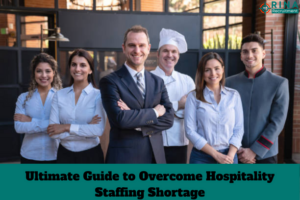At Glance
The hospitality industry has been struggling with a hospitality staffing shortage in recent years, with many businesses finding it difficult to attract and retain talented employees. This shortage can be attributed to a variety of factors, including a lack of qualified candidates, changing attitudes toward work, and increased competition for talent. The hospitality industry is facing a significant challenge due to a shortage of staff. The COVID-19 pandemic has disrupted the workforce in this sector, and many employees have left the industry, leaving vacancies that are difficult to fill. This shortage of hospitality staff has created problems for restaurants, hotels, and other hospitality businesses, leading to reduced services, longer wait times, and reduced revenues.
Increasing Demand for Hospitality Staffing
The hospitality industry has been significantly impacted by COVID-19, creating uncertainties, government funding challenges, and virtual training opportunities. As a result, the World Travel & Tourism Council (WTTC) predicts that the hospitality staffing shortage will continue to persist. The GCC alone is expected to require over 90,000 skilled hospitality professionals by 2026, with the UAE and Saudi Arabia accounting for around 82,000 of these positions.
To address these challenges, the hospitality industry needs to adopt innovative approaches to service delivery, including technology adoption and employee recruitment. To attract and retain hospitality staffing, employers must consider implementing new strategies to improve working conditions, career advancement opportunities, and compensation packages. These changes will not only help to overcome the existing labor shortage but also create a more sustainable and resilient hospitality industry.

Strategies need to follow up to overcome Hospitality Staffing Shortage
To overcome the hospitality staffing shortage, here are some strategies businesses can consider:
Offer competitive compensation and benefits
To attract top talent, hospitality staffing businesses need to offer competitive salaries, bonuses, and benefits packages. This can include health insurance, paid time off, retirement plans, and more. Many hotel employees who have decided not to return to their jobs cited the lack of benefits as a major reason. Therefore, it may be worthwhile for hotel employers to review and improve their benefits packages for hospitality staffing. It includes health and dental coverage for part-time and hourly staff as well. Other industries have already set new standards for paid sick leave, personal days, and vacation time, so hotel employers should consider providing similar benefits to their entire staff. The COVID-19 pandemic has highlighted the risks faced by hospitality staffing without medical benefits or sick leave. It offers more stability to the entire team and can make a career in the industry more attractive and supportive.
Provide training and development opportunities
Offering training and development opportunities can help businesses attract and retain employees by showing that they are committed to investing in their staff. This can include on-the-job training, mentorship programs, and professional development opportunities. Some companies are taking proactive measures to address the scarcity of skilled workers by providing extra training, outlining clear paths to advancement into management roles, and even supporting further education. This approach helps ensure that the industry can still access critical skills while allowing employees to improve their abilities.
Implement flexible scheduling
Many hospitality staffing workers have other obligations, such as family responsibilities or school, which can make traditional 9-to-5 schedules challenging. Offering flexible scheduling options can make it easier for workers to balance their work and personal commitments. To attract and retain talented employees, hotel leaders must think creatively about how to offer perks in a business that requires physical presence. They should explore options for flexible locations, hours, and communication methods to meet these needs. Despite the ongoing challenges facing the travel and tourism industry, the COVID-19 pandemic has shown that the hotel industry can adapt to changing circumstances. This presents an opportunity for hotels of all sizes, worldwide, to implement changes that will help them retain and attract great hospitality staffing employees. Moreover, with many people now more intentional about their workplace, this could be the perfect time to find the right employees.

Focus on workplace culture
Creating a positive workplace culture can help businesses retain hospitality staffing by fostering a sense of community and purpose. This can include offering team-building activities, recognizing employees for their contributions, and providing employee feedback and input opportunities. To attract more job seekers and address hospitality staffing shortages, it’s important to establish a positive work environment in your organization. This will not only make your business a more desirable place to work compared to your competitors, but it will also help promote growth in your team. Creating a welcoming workplace culture can be a powerful tool in attracting and retaining top talent.
Get Benefits from Technology
Technology can help businesses streamline their operations and make it easier for hospitality staffing employees to perform their jobs. This can include using mobile devices and apps to take orders and process payments or implementing automated inventory management systems to reduce the workload for staff. The adoption of new technology is considered one of the important factors for the inclusive growth of business. However, efficient software can simplify your entire workflow, allowing for smooth operations even with a shortage of hospitality staffing.
By digitizing functions such as stock control, waste management, scheduling, ordering systems, allergen management, and labeling requirements, technology can help streamline your business. Additionally, technology can aid in training and onboarding, enabling new hires to quickly integrate into the team through automated and customized training systems. This frees up management to concentrate on daily operations and ensures that all new employees receive the same level of training, even during high-volume periods.
Partner with educational institutions
Partnering with local colleges and universities can help businesses connect with potential employees and offer internships and training programs to students. This can be a great way to build a pipeline of qualified candidates and develop a positive reputation within the community.
Moreover, by implementing these strategies, hospitality businesses can overcome hospitality staffing shortages and attract and retain top talent.
Why choose our Recruitment Services for Hospitality Staffing
Rina Recruitment offers comprehensive recruitment services for hospitality staffing looking to hire foreign hospitality staff. With our assistance, you can take advantage of the cost savings and access to a larger pool of highly qualified candidates that hiring from overseas provides. We’ll guide you through every step of the recruitment process, from background checks to final interviews and placement, ensuring a smooth and efficient experience from start to finish.









